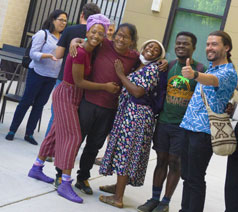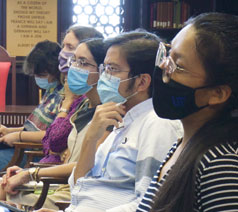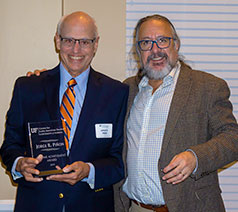Babies in cages: the dehumanization of refugees and immigrants
Event Start Date: February 21, 2020 4:00 PM
Event End Date: February 21, 2020 6:30 PM
.
Babies in Cages: The Dehumanization of Refugees and Immigrants
February 21
Ustler Hall | 4:00 - 6:30 PM
This event will analyze the historical patterns of dehumanizing Latina populations as the foreign other and as antagonistic to what is considered the dominant culture of the United States. Conference speakers will reflect on why families are separated and babies are put in cages in a democracy like the United States. We will compare the current global dehumanization of nonwhite colonized populations with previous experiences.
What are the similarities between the creation of stateless populations in Europe in the early 20th century with the stigmatization of refugees and immigrants in the 21st century? What are the similarities and differences of the racialization of populations in the 1930s and of the “illegal alien” in the United States? Are we witnessing the emergence of neofascism? What images of gender, nation, and race are used to stigmatized populations? How to respect and protect vulnerable populations?
Invited Speakers and title of talk:
- Dr. Susanne Oboler (John Jay College of Criminal Justice): Caging the Stranger Within: Latinx Belonging and (Re)movable Citizenship in the Age of Trump
- Dr. Norman Goda (University of Florida): "20,000” Ugly Adults: Thoughts on the Politics of Child Refugees, 1938 and after
- The talk concerns the congressional debate over the Wagner-Rogers bill, which called for the entrance of 20,000 German-Jewish children into the US after Kristallnacht. Contemporary scenes of detention at the United States border recall the plight of Jewish refugees in 1938, the separation of children from their parents, and racialized discourse dressed as legal discussion.
- Dr. Andreas Kalyvas (The New School for Social Research): The Stateless Citizen: Irregular Migration and the New International
- My paper explores the politicization of irregular migrants, describes the rise of the stateless citizen, and ponders on the emergence of a new post-colonial International of Labor. The argument unfolds in three steps: First, I propose the category of the ‘stateless migrant,’ that is, irregular immigrants and refugees who are either de jure or de facto stateless. Second, I turn to Hannah Arendt’s influential discussion of the plight of stateless people that remains the most important theoretical treatment of statelessness to date. Her claim that the twentieth century has produced an entirely new category of human beings who do not belong to any state and her assertion that statelessness has become one of the most serious and pressing problems of domestic and international politics could not be more timely. However, Arendt’s diagnosis that the loss of formal citizenship and political rights signifies a life deprived of public appearance and political action is directly challenged by the actual politicization of stateless migrants around the world. Revolts in detention camps, public demonstrations, sit-ins and occupations, riots and clashes with law enforcement, strikes, and collective self-organized mobilizations on borders, contradict her argument that the life of the stateless person is a superfluous life deprived of any political content, incapable of action, belonging to the private sphere. Thirdly, following this critical engagement with Arendt’s theory of statelessness, I propose a different theoretical framework that seeks to capture the possibility of a new form of post-colonial Internationalism. By focusing on the politicization of the irregular migrant, that is, the stateless person in action, associated with others, acting in concert, I argue that a new practice of transnational, de-territorialized, mobile, informal, political subjectivity is in the process of emerging that unsettles existing conceptions of bounded citizenship, legal membership, and territorial community. I propose the concept of the ‘stateless citizen’ to describe how the politicization of statelessness can open up new geopolitical spaces of emancipatory struggles from below. Against a repressive statist politics that produces illegality, exclusion, criminalization, and incarceration, the politicization of stateless persons, outside a corresponding right, challenges legal and territorial constructions of state, politics, and society in ways that could signify a radicalization of democracy.
- Dr. Miguel A. De La Torre (Iliff School of Theology): An Ethics Para Joder: A Latinx-Based Moral Response to Children in Cages
- Latinxs employing Eurocentric philosophical and/or theological thought to undergird a moral response to the human rights violations of placing the children of our people into cages complicates our response to the very structures contributing to our oppression. If Eurocentric thought domesticates our response, contributing to complicity with anti-immigrant rational; then the proper ethical response requires a methodology indigenous to our culture. If instead, we embrace the hopelessness of the situation in which Latinxs find themselves, we are left with no choice but to joder, to f*ck with the very structures - in the name of Elegua - hoping of creating new situations where liberative opportunities might arise.







